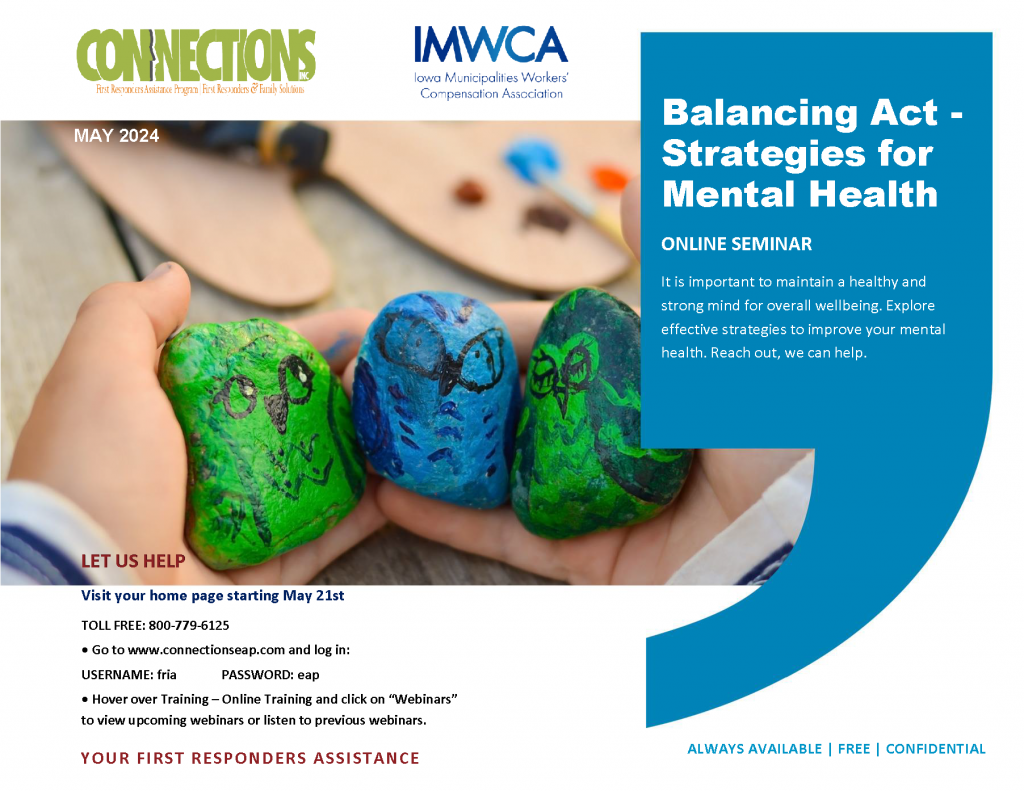
Did you know that May is Mental Health Awareness Month?
In the past mental health has been a topic that has been tip-toed around in the workplace, a taboo subject. Many things in the last few years have lifted the veil of secrecy on this topic and there is no turning back. According to a recent Society of Human Resources Management (SHRM) article, from 2022 to 2023, mental health absences have increased by 33%, and from 2017 to 2022 an increase of 300%.
As employers, you need to ask yourself the following questions;
- What are we doing to support our employee’s mental health?
- Do you have a well-being or wellness committee providing benefits, training and resources for your employees and managers?
- Are employees allowed or even encouraged to use their paid-time off?
- Do you have an Employee Assistance Program (EAP)?
- An EAP is a voluntary program that offers free and confidential counseling (short-term) and referrals.
In July 2020, IMWCA partnered with Connections EAP (Rock Valley, IA) to provide our First Responders and their dependents an EAP program. Services also provided by Connections EAP include
- Legal consultation with an attorney, credentialed in the state of residence.
- Consultation regarding personal finances by professional consumer credit counselors – Elder or Adult Consult and Care/Find in 50 states
- Child Consult and Care/Find – Special Needs Child Consult
- Adoption Information and Support Services – Pre-Natal support
- Summer Care Consult/Find
- Marriage and Relationship Enrichment Resources
- Access to web-based self-help information and assessments
If your employer does not have their own EAP provider, Connections EAP will provide an IMWCA discount to all our members.
Remember, “ your mental health is just as important as your physical health”.
Thank You for Joining Us at
IMWCA University

Winter Slips and Falls Prevention Programs Prove to be Successful

Several years ago, the IMWCA provided a study grant to the SHIELD Safety Consortium in northwest Iowa to study a prevention program for winter-related slips and falls. The program focused on each entity adopting a personal protective equipment policy that required all employees to use provided footwear traction aids during inclement winter weather conditions. The program also included an employee training component and manager/employee accountability.
Based on the initial success achieved through that prevention program, the IMWCA Board reconfigured its member grant program to support implementing this program elsewhere in the pool. The IMWCA will support the initial purchase of footwear traction aids provided the member adopts a model policy and implements all of the program elements developed by the SHIELD program.
Since the initial Shield program was launched with seven participants, another ten members have implemented the program. Over the past four winters, the IMWCA staff have been monitoring the programs and it was felt that these programs were having similar results. Recently, IMWCA staff undertook a formal analysis of the data to determine the actual results of these initiatives.
Winter-related slips and falls accounted for about 10% of all IMWCA pool claims in the ten years before the Shield program’s inception. An average of 59 claims per year were the result of a winter-related slip or fall.
These programs cover approximately 400 employees which is 2.5% of the employees covered in the entire IMWCA pool. The analysis shows that the efforts put forth to protect the 400 employees have been so successful that the entire IMWCA pool is benefitting. Winter-related slips and falls have decreased and the entire IMWCA pool is realizing a significant annual savings from the efforts of just 17 members.
Of further importance is that within the group of members with this prevention program, there have only been two indemnity claims due to winter-related factors over the past five years. That is approximately half of the occurrence rate that the entire pool experiences for indemnity claims from winter-related slips and falls.
This past winter, the data reflected a further decrease, although it should be noted, that the winter was less severe than in recent years. At this point in the current policy year, there have only been 25 associated claims.
The IMWCA staff are pleased that a successful strategy has been developed that dramatically decreases the risks associated with walking in winter weather situations at a relatively low level of monetary and time investment. The high return on investment makes the strategy practical to implement and financially sustainable for all IMWCA members.
The prevention programs have worked for entities of all sizes and across all types of work that our members undertake. With this strategy in our “toolbox” the IMWCA safety and risk improvement team will be able to assist our members address both winter-related walking issues or help them avoid the issues before their employees are injured and incur costs that may very well impact a member’s future premiums.
In summary, this injury prevention program WORKS! It is a win for the members, their employees and the IMWCA pool.





